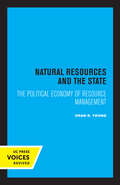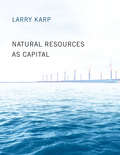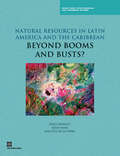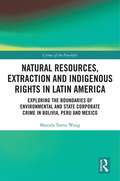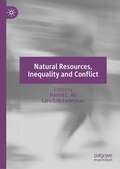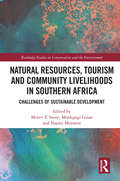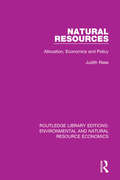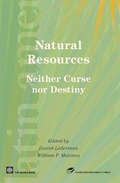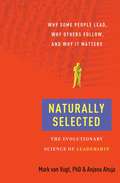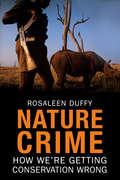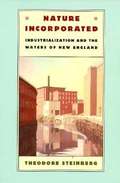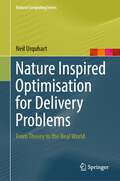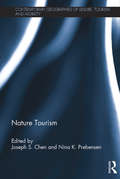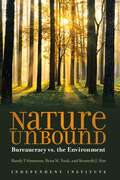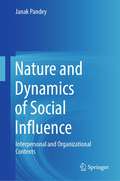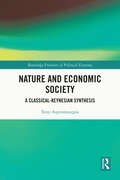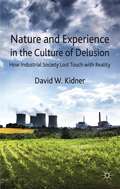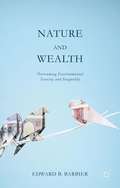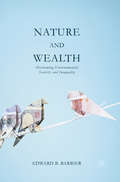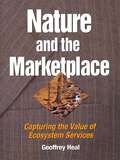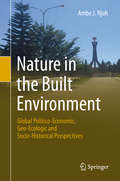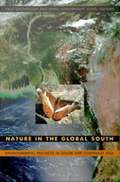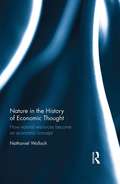- Table View
- List View
Natural Resources and the State: The Political Economy of Resource Management
by Oran R. YoungThis title is part of UC Press's Voices Revived program, which commemorates University of California Press’s mission to seek out and cultivate the brightest minds and give them voice, reach, and impact. Drawing on a backlist dating to 1893, Voices Revived makes high-quality, peer-reviewed scholarship accessible once again using print-on-demand technology. This title was originally published in 1981.
Natural Resources as Capital (The\mit Press Ser.)
by Larry KarpAn introduction to the concepts and tools of natural resource economics, including dynamic models, market failures, and institutional remedies.This introduction to natural resource economics treats resources as a type of capital; their management is an investment problem requiring forward-looking behavior within a dynamic setting. Market failures are widespread, often associated with incomplete or nonexistent property rights, complicated by policy failures. The book covers standard resource economics topics, including both the Hotelling model for nonrenewable resources and models for renewable resources. The book also includes some topics in environmental economics that overlap with natural resource economics, including climate change.The text emphasizes skills and intuition needed to think about dynamic models and institutional remedies in the presence of both market and policy failures. It presents the nuts and bolts of resource economics as applied to nonrenewable resources, including the two-period model, stock-dependent costs, and resource scarcity. The chapters on renewable resources cover such topics as property rights as an alternative to regulation, the growth function, steady states, and maximum sustainable yield, using fisheries as a concrete setting. Other, less standard, topics covered include microeconomic issues such as arbitrage and the use of discounting; policy problems including the “Green Paradox”; foundations for policy analysis when market failures are important; and taxation. Appendixes offer reviews of the relevant mathematics. The book is suitable for use by upper-level undergraduates or, with the appendixes, masters-level courses.
Natural Resources in Latin America and the Caribbean: Beyond Booms and Busts?
by John Nash Augusto De la Torre Emily SinnottPolicy makers in many countries in the Latin American and Caribbean region have found it challenging to determine how to treat natural resource commodity production and how to manage the recurrent cycles of booms and busts. 'Natural Resources in Latin America and the Caribbean: Beyond Booms and Busts?' addresses the major concerns associated with commodity dependence, summarizing the state of the art in existing literature and filling in the knowledge gaps with new analysis. The report finds that some commonly accepted negative effects of dependence on natural resources are largely myths, while some are realities. But the authors find that all the effects can be managed, and they provide practical advice on how to do so. Issues covered include long-term fiscal growth, fiscal volatility, institutional impacts, and environmental and social effects. The report analyzes the implications for the region's development and policies. 'Natural Resources in Latin America and the Caribbean: Beyond Booms and Busts?' will be of interest to policy makers, academics, and analysts, as well as others interested in the economics of commodity markets and their role in economic development.
Natural Resources, Extraction and Indigenous Rights in Latin America: Exploring the Boundaries of Environmental and State-Corporate Crime in Bolivia, Peru, and Mexico (Crimes of the Powerful)
by Marcela Torres WongIn 1989, the International Labor Organization stated that all indigenous peoples living in the postcolonial world were entitled to the right to prior consultation, over activities that could potentially impact their territories and traditional livelihoods. However, in many cases the economic importance of industries such as mining and oil condition the way that governments implement the right to prior consultation. This book explores extractive conflicts between indigenous populations, the government and oil and mining companies in Latin America, namely Mexico, Peru and Bolivia. Building on two years of research and drawing on the state-corporate and environmental crime literatures, this book examines the legal, extralegal, illegal as well as political strategies used by the state and extractive companies to avoid undesired results produced by the legalization of the right to prior consultation. It examines the ways in which prior consultation is utilized by powerful indigenous actors to negotiate economic resources with the state and extractive companies, while also showing the ways in which weaker indigenous groups are incapable of engaging in prior consultations in a meaningful way and are therefore left at the mercy of negative ecological impacts. It demonstrates how social mobilization—not prior consultation—is the most effective strategy in preventing extraction from moving forward within ecologically fragile indigenous territories.
Natural Resources, Inequality and Conflict
by Lars-Erik Cederman Hamid E. AliThis edited volume explores the link between natural resources and civil conflict, focusing especially on protest and violence in the context of mining and the extraction of minerals. The primary goal of the book is to analyze how the conflict-inducing effect of natural resources is mediated by inequality and grievances. Given the topicality of the current boom in mining, the main empirical focus is on non-fuel minerals. The work contains large-N studies of fuel and non-fuel resources and their effect on conflict. It presents case studies focusing on Zambia, India, Guatemala, and Burkina Faso, which investigate the mechanisms between the extraction of natural resources and violent conflict. Finally, the book provides a summary of the previous analyses.
Natural Resources, Tourism and Community Livelihoods in Southern Africa: Challenges of Sustainable Development (Routledge Studies in Conservation and the Environment)
by Naomi Moswete Moren T. Stone Monkgogi LenaoThis book examines the connections between natural resources, tourism and community livelihood practices in Southern Africa, highlighting the successes and constraints experienced over the last 50 years. Questioning how natural resources, tourism and community livelihoods relations can positively contribute towards development efforts, this book adopts an interdisciplinary approach to understand socio-ecological systems that characterize the dynamics for sustainable development. It explores the history of conservation and natural resource management in Southern Africa and traces the development and growth of nature-based tourism. Boasting a wide range of tourism landscapes, including national parks, wetlands, forests and oceans, the book draws on case studies from a variety of Southern African countries, including Botswana, Namibia and South Africa, and considers the political challenges for implementing policies and practices. Furthermore, it analyses broader issues such as the impact of climate change, human–wildlife co-existence and resulting conflicts, poor access to funding and poverty in local communities. The book argues that the links between conservation and livelihoods can be best understood by considering the different approaches to reconciling the demands of conservation and livelihoods that have evolved over the past decades. Containing contributions from natural and social sciences the book provides guidance for practitioners and policymakers to continue to shape policies and practices that are in line with the key tenets of sustainable development. It will also be of great interest to students and scholars researching Southern Africa, sustainable tourism and conservation.
Natural Resources: Allocation, Economics and Policy (Routledge Library Editions: Environmental and Natural Resource Economics)
by Judith ReesIn this book, first published in 1990, Judith Rees considers the spatial distribution of resource availability, development and consumption, and the distribution of resource-generated wealth and welfare. Showing that there are no simple answers, she analyses the complex interactions between economic forces, administrative structures and political institutions. This well-structured text is essential reading for upper-level students in geography, environmental planning, economics and resource management.
Natural Resources: Neither Curse nor Destiny
by Daniel Lederman William F. Maloney'Natural Resources: Neither Course nor Destiny' brings together a variety of analytical perspectives, ranging from econometric analyses of economic growth to historical studies of successful development experiences in countries with abundant natural resources. The evidence suggests that natural resources are neither a curse nor destiny. Natural resources can actually spur economic development when combined with the accumulation of knowledge for economic innovation. Furthermore, natural resource abundance need not be the only determinant of the structure of trade in developing countries. In fact, the accumulation of knowledge, infrastructure, and the quality of governance all seem to determine not only what countries produce and export, but also how firms and workers produce any good.
Naturally Selected: Why Some People Lead, Why Others Follow, and Why It Matters
by Mark Van Vugt Anjana AhujaA groundbreaking and definitive work of evolutionary psychology that upends everything we thought we knew about leadership. We are all leaders or followers--or both--and we can recognize leadership in almost every area of life. But what makes a good, bad, or even outstanding leader? Fusing psychology, business, evolutionary biology, and current affairs, Naturally Selected examines the evolution of leadership over several million years, from birds and bees to apes and humans, and presents a compelling new hypothesis: the slow pace of evolution has resulted in a mismatch between modern leadership and the kind of leadership for which our Stone Age brains are wired. Grounded in rigorous academic scholarship, written with journalistic flair, and full of fascinating examples drawn from politics, commerce, sports, and culture, this extraordinary, eye-opening book explains: why tall presidential candidates usually beat short ones; why great athletes often make lousy managers; why we don't like working for huge companies; why women chief executives attract hostility; why middle managers are universally reviled. In doing so, Naturally Selected reveals how the psychology of leadership affects us all--and how we can change our lives by improving the ways we lead and follow.
Nature Conservancy
by Allen Grossman Kristin J. Lieb Jane Wei-SkillernAlmost immediately upon being appointed CEO of The Nature Conservancy (TNC), Steve McCormick undertakes a radical reorganization of this global institution. TNC is the largest and, by most measures, the most successful environment organization in the world, with revenues in excess of $650 million and a strong balance sheet. Nevertheless, after an in-depth analysis using the McKinsey-developed 7-S model, McCormick contends that the current structure, a U.S. organization with overseas offices, must be transformed to a truly global entity to fulfill its mission. Most of the staff and volunteers at TNC agree with the proposed change but protest its speed and scope. With the plan half implemented, McCormick must decide whether to slow down or forge ahead, knowing there are significant potential consequences to either decision. This case explores how a nonprofit measures success, how the content and process components of change must intersect in a carefully planned fashion, the tensions between the benefits of local autonomy, and the need for organization-wide standards and oversight.
Nature Crime
by Rosaleen DuffyIn this impressively researched, alarming book, Rosaleen Duffy investigates the world of nature conservation, arguing that the West's attitude to endangered wildlife is shallow, self-contradictory, and ultimately very damaging. Analyzing the workings of the black-market wildlife industry, Duffy points out that illegal trading is often the direct result of Western consumer desires, from coltan for cellular phones to exotic meats sold in London street markets. She looks at the role of ecotourism, showing how Western travelers contribute--often unwittingly--to the destruction of natural environments. Most strikingly, she argues that the imperatives of Western-style conservation often result in serious injustice to local people, who are branded as "problems" and subject to severe restrictions on their way of life and even extrajudicial killings.
Nature Incorporated: Industrialization and the Waters of New England
by Theodore SteinbergA great deal of arrogance surrounds this late-twentieth-century attitude toward the environment, and a great deal of history as well. What started as a research paper at Brandeis University expanded into a book that explores the role of the Industrial Revolution in this aggressive stance toward the natural world. The transformation of nature is at least as old as our presence as a species on this planet. But the advent of the industrial age marked a shift in humankind's relations with the earth. Steinberg concerns himself mainly with describing this shift as it was felt in New England, to journey back to a time when the task of subduing nature was full of hard-fought battles and much less arrogance.
Nature Inspired Optimisation for Delivery Problems: From Theory to the Real World (Natural Computing Series)
by Neil UrquhartThis book explains classic routing and transportation problems and solutions, before offering insights based on successful real-world solutions. The chapters in Part I introduce and explain the traveling salesperson problem (TSP), vehicle routing problems (VRPs), and multi-objective problems, with an emphasis on heuristic approaches and software engineering aspects. In turn, Part II demonstrates how to exploit geospatial data, routing algorithms, and visualization. In Part III, the above techniques and insights are combined in real-world success stories from domains such as food delivery in rural areas, postal delivery, workforce routing, and urban logistics.The book offers a valuable supporting text for advanced undergraduate and graduate courses and projects in Computer Science, Engineering, Operations Research, and Mathematics. It is accompanied by a repository of source code, allowing readers to try out the algorithms and techniques discussed.
Nature Tourism (Contemporary Geographies of Leisure, Tourism and Mobility)
by Joseph S. Chen Nina K. PrebensenIn recent decades, the fast rise of emerging economies, like the BRICS nations, has propelled the growth of tourism worldwide. Meanwhile, a plethora of nature destinations has been developed to meet the diverse needs of the new wave of demand from emerging economies and to entice existing tourists from advanced and rich economies. <P><P>Nature Tourism augments the current literature on the benefits and pitfalls in recent developments of nature tourism, tracing the history in development, highlighting the ecological impacts and showcasing the current practices in nature tourism, along with discussions on specific tourist markets from holistic viewpoints embracing lessons learned from various destination nations and continents across the globe. A host of topics with global significance will be explored such as the effect of climate change on nature tourism, technological innovation in managing nature tourism, visitor management in nature tourism and market positioning in a highly competitive environment. These are reviewed in a wide range of countries from USA/Canada, South America, Scandinavian countries, the Swiss Alps, Middle-East countries, Africa, China and Australia/New Zealand. <P><P>This book will offer significant insight into nature-based tourism and its future development. It will be of interest to upper-level students, researchers and academics in tourism, environmental studies, development and sustainability.
Nature Unbound: Bureaucracy vs. the Environment
by Ryan M. Yonk Randy T Simmons Kenneth J. SimWhat if what we think we know about ecology and environmental policy is just wrong? What if environmental laws often make things worse? What if the very idea of nature has been hijacked by politics? What if wilderness is something we create in our minds, as opposed to being an actual description of nature?In 1934, former U.S. Forest Service offcial Aldo Leopold, a godfather to the modern environmental movement, wrote that &“restrictive laws&” had &“largely failed&” in their mission to conserve America&’s forests, rivers, and other natural resources. Less than forty years later, however, as various events pushed environmental concerns into the public spotlight, lawmakers from both parties championed legislation far more sweeping and restrictive than any Leopold had witnessed. How well did these &“restrictive laws&” work to right environmental wrongs? Why did so many miss the mark? And how should we go about improving our policies? In Nature Unbound, authors Randy Simmons, Ryan M. Yonk, and Kenneth J. Sim offer a devastating critique of federal environmental policy by scrutinizing it through the lenses of biological ecology and political ecology. This powerful framework, they show, reveals that environmental policy has been guided since the late 1960s by demonstrably false assumptions responsible for a host of ineffective or wasteful, command-and-control policies—on air pollution, water pollution, endangered species, wilderness, renewable energy, and more. The mistakes have also empowered political entrepreneurship in ways that have encroached on property rights, burdened the general public, and degraded the civic landscape. More than a critique of false assumptions and flawed policies, Nature Unbound offers bold principles to help us rethink environmental objectives, align incentives with goals, and af?rm the notion that human beings are an integral part of the natural order and merit no less consideration than Earth&’s other treasures. Ultimately, nothing less can succeed in our efforts to restore natural resources and revitalize our social and political ecosystem.
Nature and Dynamics of Social Influence: Interpersonal and Organizational Contexts
by Janak PandeyThe book presents the various ways in which persuasion can be used to make people behave in certain ways without coercion, intimidation, or brute force. It explores the intricacies of social influence processes like self-presentation, impression management, ingratiation, persuasion, manipulative social behavior, and compliance in socio-cultural contexts. Social influence constitutes one of the key themes in the field of social psychology. Contributions in the book highlight social influence behavior and its importance in human social life. The book deepens the reader's understanding of social psychology research on the science and applications of social influence. It invites readers to consider critical questions, such as the interactive effects of personality/disposition and situational factors on social influence. Given its scope, the book is of interest to those in academic fields like social psychology, political science, mass communication, and marketing.
Nature and Economic Society: A Classical-Keynesian Synthesis (Routledge Frontiers of Political Economy)
by Tony AspromourgosThis book focuses on the interrelationship between nature and the human economy. Building upon his decades of research into classical and Keynesian economics, Tony Aspromourgos here turns his attention to the interrelationship between nature and the human economy. The result is a tightly argued, concise but comprehensive interpretation of that vital issue, undertaken in the framework of a Classical-Keynesian synthesis. The classical dimension is utilization of a surplus approach to production and distribution, and the Keynesian dimension, incorporation of demand-side determination of economic activity levels and growth. In this conception the human economy is understood as a circular flow but an incompletely circular system: crucially dependent upon nature both as a source of finite non-renewable and exhaustible resources for human production and consumption and as the destination or ‘sink’, also finite, for the waste and pollution from that production and consumption. This is an introductory account of the subject, providing maximum accessibility by presupposing only basic knowledge of economic analysis and only elementary algebra, but including a wide-ranging guide to further and more advanced relevant literature. Part I provides a comprehensive overview of the Classical-Keynesian approach, in the usual manner of economic analysis, without systematic incorporation of nature. Part II then incorporates the various dimensions of the natureeconomy interrelationship. This book will be of great interest to readers of economic theory, economics and the environment, and heterodox economics.
Nature and Experience in the Culture of Delusion: How Industrial Society Lost Touch with Reality
by David W. KidnerIndustrialism has alienated us from nature, disconnected us from our own embodiment, and blinded us to the character of the technological society we have ourselves have produced. This book brings together ideas and research from both social and natural sciences to throw light on the hidden dimensions of industrial life, showing how the emerging global economic system has dissolved our embodied subjectivity into industrial processes. The symbolic abilities that have allowed us to dominate all other creatures have now entrapped us within systems that we do not understand and have little control over, making us as vulnerable to the extension of economic and technological ideologies as our ancestors were to the natural threats that surrounded them. If we are to regain our humanity and integrity, the essential first step, outlined in this book, is to recognise and challenge the sources of our own powerlessness.
Nature and Wealth: Overcoming Environmental Scarcity and Inequality
by Edward B. BarbierNature and Wealth.
Nature and Wealth: Overcoming Environmental Scarcity and Inequality
by Edward BarbierDrawing on historical and contemporary evidence, this book argues that growing environmental degradation and wealth inequality are linked to how nature is exploited to create economic wealth. Ending the under-pricing of natural capital and insufficient human capital accumulation is essential to overcoming structural imbalance in modern economies.
Nature and the Marketplace: Capturing The Value Of Ecosystem Services
by Geoffrey HealIn recent years, scientists have begun to focus on the idea that healthy, functioning ecosystems provide essential services to human populations, ranging from water purification to food and medicine to climate regulation. Lacking a healthy environment, these services would have to be provided through mechanical means, at a tremendous economic and social cost.Nature and the Marketplace examines the controversial proposition that markets should be designed to capture the value of those services. Written by an economist with a background in business, it evaluates the real prospects for various of nature's marketable services to "turn profits" at levels that exceed the profits expected from alternative, ecologically destructive, business activities. The author: describes the infrastructure that natural systems provide, how we depend on it, and how we are affecting it explains the market mechanism and how it can lead to more efficient resource use looks at key economic activities -- such as ecotourism, bioprospecting, and carbon sequestration -- where market forces can provide incentives for conservation examines policy options other than the market, such as pollution credits and mitigation banking considers the issue of sustainability and equity between generations .Nature and the Marketplace presents an accessible introduction to the concept of ecosystem services and the economics of the environment. It offers a clear assessment of how market approaches can be used to protect the environment, and illustrates that with a number of cases in which the value of ecosystems has actually been captured by markets.The book offers a straightforward business economic analysis of conservation issues, eschewing romantic notions about ecosystem preservation in favor of real-world economic solutions. It will be an eye-opening work for professionals, students, and scholars in conservation biology, ecology, environmental economics, environmental policy, and related fields.
Nature in the Built Environment: Global Politico-Economic, Geo-Ecologic and Socio-Historical Perspectives
by Ambe J. NjohA good understanding of the status quo is necessary for the success of efforts to develop and maintain nature in built space. Accordingly, this book conducts an environmental scan of the context of these efforts in global perspective. In particular, it develops and employs a novel environmental scanning model (ESM) designed to rigorously analyze the political, economic, social, technological, ecological, cultural and historical (PESTECH) contexts of initiatives to promote biodiversity in the built environment. The focus is on four specific substantive areas of environmental policy, namely forestry, water, food, and energy. The units of analysis roughly correspond with the major United Nations Environmental Programme (UNEP) regions of the world, including sub-Saharan Africa, Middle-East and North Africa, Asia and the Pacific, Western Europe, North America, and Latin America and the Caribbean.
Nature in the Global South: Environmental Projects in South and Southeast Asia
by Paul Greenough Anna Lowenhaupt TsingA nuanced look at how nature has been culturally constructed in South and Southeast Asia, Nature in the Global South is a major contribution to understandings of the politics and ideologies of environmentalism and development in a postcolonial epoch. Among the many significant paradigms for understanding both the preservation and use of nature in these regions are biological classification, state forest management, tropical ecology, imperial water control, public health, and community-based conservation. Focusing on these and other ways that nature has been shaped and defined, this pathbreaking collection of essays describes projects of exploitation, administration, science, and community protest. With contributors based in anthropology, ecology, sociology, history, and environmental and policy studies, Nature in the Global South features some of the most innovative and influential work being done in the social studies of nature. While some of the essays look at how social and natural landscapes are created, maintained, and transformed by scientists, officials, monks, and farmers, others analyze specific campaigns to eradicate smallpox and save forests, waterways, and animal habitats. In case studies centered in the Philippines, India, Pakistan, Thailand, Indonesia, and South and Southeast Asia as a whole, contributors examine how the tropics, the jungle, tribes, and peasants are understood and transformed; how shifts in colonial ideas about the landscape led to extremely deleterious changes in rural well-being; and how uneasy environmental compromises are forged in the present among rural, urban, and global allies. Contributors: Warwick Anderson Amita Baviskar Peter Brosius Susan Darlington Michael R. Dove Ann Grodzins Gold Paul Greenough Roger Jeffery Nancy Peluso K. Sivaramakrishnan Nandini Sundar Anna Lowenhaupt Tsing Charles Zerner
Nature in the History of Economic Thought: How Natural Resources Became an Economic Concept
by Nathaniel WollochFrom antiquity to our own time those interested in political economy have with almost no exceptions regarded the natural physical environment as a resource meant for human use. Focusing on the period 1600-1850, and paying particular attention to major figures including Adam Smith, T.R. Malthus, David Ricardo and J.S. Mill, this book provides a detailed overview of the intellectual history of the economic consideration of nature from antiquity to modern times. It shows how even someone like Mill, who was clearly influenced by romantic notions regarding the spiritual need for contact with pristine nature, ultimately regarded it as an economic resource. Building on existing scholarship, this study demonstrates how the rise of modern sensitivity to nature, from the late eighteenth century in particular, was in fact a dialectical reaction to the growing distance of modern urban civilization from the natural environment. As such, the book offers an unprecedentedly detailed overview of the intellectual history of economic considerations of nature, whilst underlining how the history of this topic has been remarkably consistent.
Nature of Analytical Competition: Using Analytics to Build a Distinctive Capability
by Thomas H. Davenport Jeanne G. HarrisWhat does it mean to compete on analytics and how can companies move in that direction? This chapter lays out the general ideas around analytical competition, providing a few examples from the worlds of business and sports. This chapter was originally published as Chapter 1 of "Competing on Analytics."
